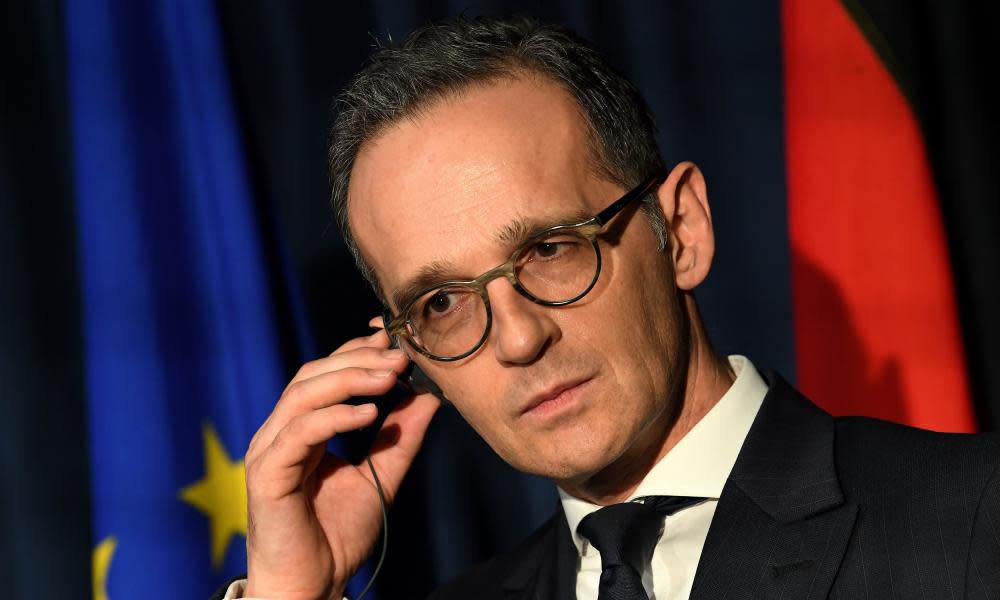MPs seize on German minister's suggestion of further Brexit talks

Opponents of Theresa May’s Brexit deal have seized on a suggestion by Germany’s foreign minister that further negotiations could be opened with the EU should MPs reject the prime minister’s agreement on Tuesday evening.
With hours to go before MPs have their say in parliament, Heiko Maas spoke of his doubts that the agreement could be radically changed but also suggested there might be grounds for further talks.
“The agreement stands, as it is,” the German minister said. “I doubt very much that the agreement can be fundamentally reopened. If there were a better solution, it would already have been put forward.”
Maas said the withdrawal agreement and the accompanying political declaration on the future relationship was the best vehicle for avoiding a no-deal Brexit, but he added: “If it goes wrong tonight, there could be further talks.”
The leading Brexiter and former cabinet minister Owen Paterson tweeted in response: “Very significant statement from Germany’s foreign minister that the EU would be prepared to reopen talks if and when the withdrawal agreement is defeated in the Commons.”
MPs planning to vote down the deal were later offered further grounds for hope by the head of the eurozones finance ministers, Mario Centeno, who said the EU and Britain could talk further and adjust their positions to avoid a no-deal Brexit.
“We will see the result (of the vote) today and we can adjust our trajectory,” he said. “We can open all the dossiers ... We need to take informed decisions with total calm and avoid a no-deal exit. Practically anything is better than a no-deal exit.”
The interventions will be regarded as unhelpful in Downing Street, where the size of the defeat in the meaningful vote on the deal will instruct the UK government’s next move.
Earlier in the day, Berlin denied reports that Angela Merkel had signalled to the prime minister in a recent call that she would engineer a significant concession to ensure victory in a second vote on the deal, should the first fail as expected.
A statement from the chancellery claimed the reports had misrepresented the call, and that Merkel had “given no assurances beyond those that were discussed in the European council in December”. At that summit the EU’s 27 leaders had merely restated that the customs union envisaged in the backstop, to avoid a hard border on the island of Ireland, would be temporary.
The EU has repeatedly insisted that the deal struck by May is the “only deal” and that there will not be a renegotiation of the withdrawal agreement, including the backstop, which Brexiters fear will keep the UK indefinitely trapped in a customs union with the bloc.
Speaking in Strasbourg, between plenary sessions of the European parliament, the European commission president, Jean-Claude Juncker, on being asked about his message to the British parliament, told reporters: “I would hope that they behave in a responsible way.”
The Austrian chancellor, Sebastian Kurz, whose country has held the rolling presidency of the EU for the last six months, said the deal being put in front of parliament was a fair compromise.
He said: “The European Union, I believe, in negotiations with the United Kingdom has nothing to reproach itself for because we negotiated a very balanced exit agreement and we also have a political declaration on the future of our relationship.
“Now, even if things don’t go our way this evening in the vote in the British parliament and even if the next few weeks and months are rocky it is important that we continue to sing from the same hymn-sheet. We in the council, commission and parliament.”
The British prime minister is expected to return to Brussels within 48 hours should her defeat in parliament be manageable, and a possible way forward for the current deal emerges.
But Brussels is preparing itself for a request for an extension to the two-year negotiating period from Downing Street in the coming weeks, given the limited time available before Brexit day on 29 March.
Leaders of the groups in the European parliament were sceptical on Tuesday about further talks, however.
The leader of the Greens, Philippe Lamberts, a Belgian MEP, said: “She can come back but this reality will not change. This is why giving more time to the UK under article 50 … will not change the reality.
“More time for a referendum, sure. More time for a general election, sure. More time to think about it, no. The facts are now. Make up your mind ... If the parliament is not able to make up its mind, ask the people.”
The socialist group leader, Udo Bullmann, a German MEP, voiced his backing for a second referendum, saying: “We are deeply convinced that the British people should have the opportunity to assess the situation in one way or another.”.
Esteban González Pons, a Spanish MEP speaking for the largest group in parliament, the centre-right European People’s party, said: “The EPP is not against the extension of article 50. If the prime minister of the UK were to need more time, then it will certainly not be the EPP group which would oppose granting additional time. But this would need to be additional time denominated in weeks rather than months.”

 Yahoo News
Yahoo News 